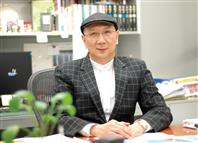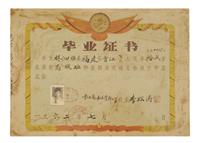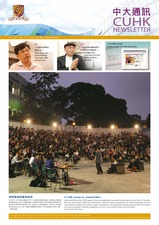As the head of the Campus Development Office, are you guided by any philosophy when making decisions?
Well, I believe that there are no perfect solutions in the world, only the best compromise. For instance, if given a clean piece of paper on which to draw, one may find it difficult to produce anything. But with constraints in the brief, even conflicting ones, it is rewarding to come up with the best solution. I like user-oriented, cost-effective, maintenance-free, and sustainable designs. Aesthetics are subjective; but, architects have a role in creating good architecture as art for people to appreciate, besides functionality and sustainability.
How have your eclectic experiences in life shaped the way you behave?
I grew up in an unimaginably poor environment in the 60s after I came to Hong Kong to join my mother as a village boy from the mainland. My mother and I shared the lower level of a bunk bed in a small room of 50 sq ft housing eight people from five families. The landlady required us to turn off the lights at midnight because not doing so would hike the electricity bill. But we had to string beads at night to make ends meet, so we had to leave the light on and stuff up the door gap with towels, black out windows in the summer heat of 35℃ without fans, let alone air conditioning. My past made me realize how important it is that needy students get help, and that is why I’ve set up scholarships and bursaries.
Tell us about the scholarships you set up.
In my final year as an architecture student, I didn’t have money to present my thesis. I had to apply to emergency funds for several hundred dollars in order to be able to graduate. In 2004, I set up my first scholarship in my native village in Fujian Province and named it after my parents. I showed the villagers my primary school graduation certificate. In fact, instead of degree and professional qualification certificates, that certificate follows me in my office wherever I go. Up to now my scholarship has benefitted a total of some 500 students, including primary and secondary school students, and those accepted by key universities. Let me add that it’s open not only to youngsters of the villages, but also to youngsters from Northern provinces studying there. Last year, a student got into Shandong University ranked 14th nationwide, and one to Huazhong University of Science and Technology, ranked 16th. This makes me very proud. There’s also a scholarship for overseas studies but so far none has been given out.
My daughter followed my footsteps and set up a scholarship in her alma mater. When my mother-in-law died early this year, my wife and I also established one in her name. I spent about a quarter of a million last year on scholarships. It’s not a small amount for a wage earner, but I don’t feel any poorer for it.
Please tell us about the Voluntary Summer English Programme you started in Fujian (2005) and Chaozhou (2010)?
My wife is the vice-principal of a well-known Anglo-Chinese school in Hong Kong, so we wanted to see if we could make use of her background to help mainland students learn English better. The programme is very well received now—the students love it—but it had its teething pains. Recruiting teachers was difficult initially. At one point, I had to distribute leaflets at residences on campus. We managed to get friends, children of colleagues, international students, and NET teachers. Now, we work with the summer programme of CUHK to recruit international volunteers. It was well worth the effort, we are invited to extend the programme to Shunde in the summer of 2012.
When I came to Hong Kong, I didn’t know a word of English. I gave up schooling and got a job as an apprentice at a photo studio. After a week, I went back to school feeling there was no future without education. I struggled with the language, to put it mildly. One night, I overheard a talk show on a neighbour’s radio. A lecturer from a university was saying how difficult it was to learn a foreign language, but if we kept in mind that the purpose was communication, then we should just focus on getting ourselves understood, rather than fret over grammar or if the words we were saying existed. After that I kept practising English and asked my teacher to correct my writings. Eventually I got into university.
Can you tell us, as an architect, which buildings fascinate you?
Well, as a student, I loved the chapel of Notre Dame du Haut, designed by Le Corbusier, in Ronchamp, France. I’ve played many roles in life, besides practising as an architect. I was in hotel management and logistics; I was once architect, project manager, contractor and finally the operator of a hotel; I was involved in amusement, bus and manufacturing businesses. But the best part in my career was working for the University. I was very happy for the opportunity to pursue design excellence in campus development, for the appreciation of my work, and for the full support of the University. 



































































































































































Social Bookmarks